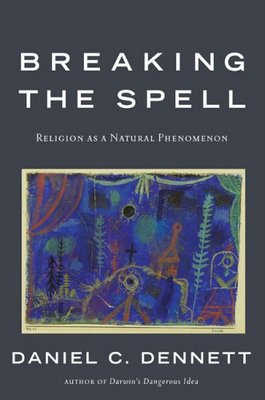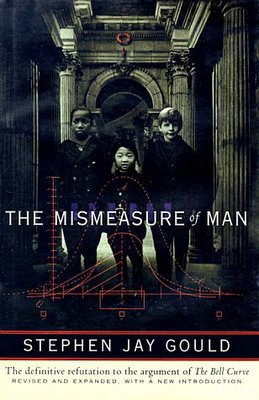Gould's 1981 classic work (revised and expanded in 1996) is an attempt to describe the history of intelligence testing and how those (spurious) results have been used to justify social inequalities. On that point, I think he succeeded admirably. The book is superbly written, highly informative and thorough. A little dry at some points, but such is the trade-off for necessary details. I found it both saddening and sickening to read about the terribly bad science that occurred in the 1800s and 1900s that was used to 'demonstrate' that various groups were inferior. All too often conclusions were decided upon and the facts manipulated to reach them. Sometimes this process was conscious, other times unconscious, but at most times general logical flaws dominated the discipline of mental testing.
Gould's main point is that the notion of a real, unchanging and heritable intelligence factor is flawed. He is not saying that some people are not smarter than others, nor is he saying that there are not genetic factors involved in what is/becomes a person's intelligence. These concessions were made numerous times and yet many people seem to have misunderstood Gould's stance. This was evident to me after reading some of the reviews on
Amazon.ca of
The Mismeasure of Man. Many people seem to think Gould is implying something he is not. I guess such things occur with faulty inferential mechanisms.
The other main issue of the book concerns the reification of intelligence. To reify is make something real that was/is abstract. IQ, as a single number, is an aggregate of many types of mental tests that are trying to assess different aspects of intelligence. Consequently, when many measures are reduced to one measure, some information has to be lost. Many people think IQ is a tangible thing, but it is actually a measure derived from a statistical process that treats it as abstract. Additionally, depending on how one interprets the statistics, a different output may be generated. This is nothing new to some and very new to most.
As a result of this new information, you might say, "Okay, so IQ is a bit of a flawed concept, at least how it is popularly understood. But... aren't some people smarter than others?" Here is where I'll diverge from the book review and just share some thoughts (which are related to the book).
The quotation with which this post begins is one that I took from
The Mismeasure of Man (p.62) and I would say I agree with the second line. Of course, 'greater' does not necessarily mean smarter, but for my purposes it could mean almost any adjective. As long as there are differences in the genetic composition AND in environment of organisms (humans, too!) then there will be differences in the greatness ('blankness') of people. Pretty simple concept, pretty hard to refute. (If you have a refutation, please share it.) So then, there must be people smarter than others, right? Sure. I agree... but wait, what do you mean by 'smarter' and what does that mean for how you treat people? Addressing the second issue first, people should be treated with compassion and appropriate respect. For the most part, this means treating people as equal even when they are not. Though the notion of equality is much more complicated when examined in detail, it works quite well on a general level and I think it can presently be left at that.
As for the first issue, what would be the best way to define 'smart?' Knowledge of the world? (working-space)Memory? Processing speed? Absract/conceptual reasoning? Symbol recognition? Mathematical abilities? Well, IQ tests currently use all of those aspects to assess someone's 'intelligence quotient.' There are subscales in each area and these are aggregated to produce an IQ. Of course, if one only has one number, it is impossible to determine whether a person is comparably good in the quantitative and verbal sections, or if performance in one section is much better than in the other. Why not keep the subscales? I don't actually know, but I think it is because often the subscales are comparable, and there become many numbers to work with.
(Anyone have any data to share?)Is IQ useful to measure what people care about? We've all met smart people that say or do stupid things (at a frequency just as great as 'average' people). As the previous sentence contradicts itself, we could ask how is this possible. Simply, the tests don't measure everything. They don't measure understanding of one's self or the world, they don't measure personality traits or temperaments, nor do they measure kindness.
Here is where you have to ask yourself what do you care about? What would you measure? How would you measure it?
I think a measure of something like 'decision competency' would be much more useful. Outcomes in the person's life would be used as a measure of how well they make decisions they value. Well, isn't that what many people automatically thing when they think of 'smart?' That is an empirical question, but my guess is that it is.
As tempted as I am to measure people's intelligence as the degree to which they believe and act in accordance with my philosophical beliefs, I know that just won't do. Yet, I do think kindness or some measure of empathy might be more useful for the world (that I want) than IQ.
But why must we choose? Test them all! There is some sense to this as it would provide a more complete profile of a person and would allow for correlations between tests to be discovered. There is some nonsense though, in that most often people are not fully assessed just for fun, but with specific goals in mind. Additionally, I believe it has already been shown that empathy and IQ are not highly related. Decision competency is in its infancy, but I see worth there.
The Ante-, pen-, ultimate topic(s) to be discussed:(1) Whether races differ in intellect. This topic involves discussions about what race is, how to measure that, and comparing the variance (within groups to between groups is a no-no) and other comparisons... but the short answer is 'no'. Not that I know of. The other issue is the trade-off between accurate description and interpretation. Say it is discovered that white people (on average) have lower IQs than black people (on average). Will this information be used compassionately to help white people in school or used to justify social discrimination and prejudice? In a way it is not a fair example, because the reverse 'fact' has been found so many times in the past that now white people have most of the power so they need very little 'help' (comparably). I'm attempting to highlight that the world is complex and that extra reflection shall hardly ever be retrospectively viewed as superfluous.
(2) Domain specifc 'intelligence.' This is a very important issue, an occurrence that is obvious to many but hard for me to fully grasp. I say 'fully grasp' meaning that the fact would shift my 'natural' way of thinking by total incorporation and result in a new automatic default when interpreting the world. When I hear a great writer that does not speak well, or learn that a graceful athlete is clumsy off the field or that someone that cares deeply about and works to help people in need has a terrible personal life, it causes me cognitive dissonance. How can some people be so competent at one thing, but not at another? The obvious answer might be that I am examining two different situations and the perceived underlying similarity is nonexistent. I would say this is true part of the time because it is also true that different (but highly similar) situations provoke different responses (abilities) in the same person. That is just how it goes.
(3) Consistency/self-awareness as intelligence. Personally, a useful measure of intelligence is one that would that would assess the degree to which an individual is aware of the choices they make, the actions they perform and how those relate to other executed choices and behaviours. This would tap into working-space memory and the ability to make connections across (seemingly) disparate domains to assess consistency. Why is consistency important (to me)? I don't like hypocrisy. I don't know (m)any that do. Given resources and processing time, people can be useful detectors of those that do not play fair, but they seem to be able to ignore or dismiss their own violations of fairness in very similar situations. It would seem only those forced to recognize their inconsistency do so and only then some of the time.
Of a world with 6 billion humans, it must be recognized that the similarities among their 6 billion goal-structures are limited.








